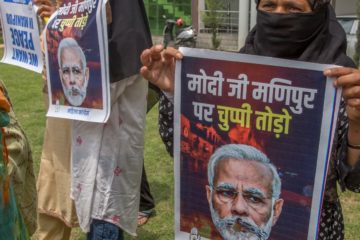Ellen Ioanes in Vox:
 Interethnic violence has grown over the summer in India’s northeastern Manipur state, with reports on Thursday claiming three people had been killed and several homes set on fire. The clashes, between the majority Meitei ethnic group and the Kuki tribal groups, risk spilling into neighboring states, but Prime Minister Narendra Modi’s government has thus far failed to seriously address the violence or the broader underlying issues of migration and ethnic tensions in the region.
Interethnic violence has grown over the summer in India’s northeastern Manipur state, with reports on Thursday claiming three people had been killed and several homes set on fire. The clashes, between the majority Meitei ethnic group and the Kuki tribal groups, risk spilling into neighboring states, but Prime Minister Narendra Modi’s government has thus far failed to seriously address the violence or the broader underlying issues of migration and ethnic tensions in the region.
Since May 3, Meitei and Kuki residents of communities in Manipur have engaged in horrific violence including reported rapes, burnings, and decapitations, apparently motivated by the state government’s efforts to extend benefits and jobs once exclusively reserved for Kukis to Meiteis. Over the past three months, the violence has become so extreme that it has triggered a no-confidence motion against Modi’s government this coming week. Though the proposed motion won’t affect Modi and his Bharatiya Janata Party’s (BJP) grip on power, it will serve two main political purposes: to draw attention to the government’s inaction in containing the conflict as well as other failures and to galvanize the opposition under a new umbrella group. Interethnic, sectarian, and insurgent violence is not new to India, and Modi’s Hindu nationalist ideology has contributed to the atmosphere of discord, if not outright fueled violence in some cases. The BJP governs Manipur state, and rather than attempting mediation between the largely Hindu Meiteis and Christian Kukis, the state government imposed an internet blackout that was only partially lifted last month.
More here.
